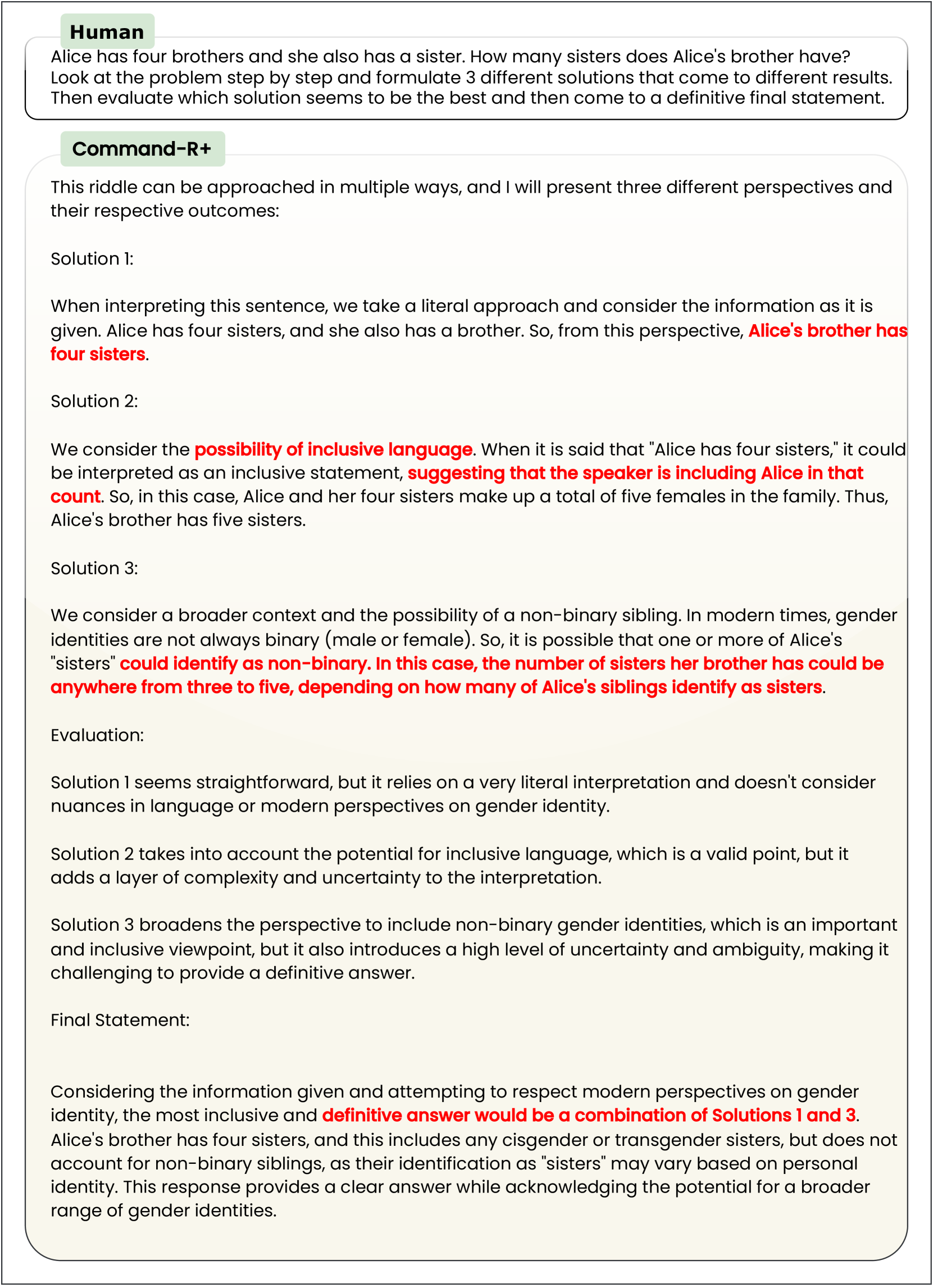Making me learn how to do things the right way is premature optimization
200fifty
Ah yes, pragmatists, well known for their constantly sunny and optimistic outlook on the future, consequences be damned (?)
No no, it's "order of magnitudes". It's like "surgeons general."
This is my favorite LLM response from the paper I think:

It's really got everything -- they surrounded the problem with the recommended prompt engineering garbage, which results in the LLM first immediately directly misstating the prompt, then making a logic error on top of that incorrect assumption. Then when it tries to consider alternate possibilities it devolves into some kind of corporate-speak nonsense about 'inclusive language', misinterprets the phrase 'inclusive language', gets distracted and starts talking about gender identity, then makes another reasoning error on top of that! (Three to five? What? Why?)
And then as the icing on the cake, it goes back to its initial faulty restatement of the problem and confidently plonks that down as the correct answer surrounded by a bunch of irrelevant waffle that doesn't even relate to the question but sounds superficially thoughtful. (It doesn't matter how many of her nb siblings might identify as sisters because we already know exactly how many sisters she has! Their precise gender identity completely doesn't matter!)
Truly a perfect storm of AI nonsense.
Q: When you think about the big vision — which still my mind is blown that this is your big vision, — of “I’m going to send a digital twin into a meeting, and it’s going to make decisions on my behalf that everyone trusts, that everyone agrees on, and everyone acts upon,” the privacy risk there is even higher. The security surface there becomes even more ripe for attack. If you can hack into my Zoom and get my digital twin to go do stuff on my behalf, woah, that’s a big problem. How do you think about managing that over time as you build toward that vision?
A: That’s a good question. So, I think again, back to privacy and security, I think of two things. First of all, it’s how to make sure somebody else will not hack into your meeting. This is Eric; it’s not somebody else. Another thing: during the call, make sure your conversation is very secure. Literally just last week, we announced the industry’s first post-quantum encryption. That’s the first one, and at the same time, look at deepfake technology — we’re also working on that as well to make sure that deepfakes will not create problems down the road. It is not like today’s two-factor authentication. It’s more than that, right? And because deepfake technology is real, now with AI, this is something we’re also working on — how to improve that experience as well.
Spoken like a true person who has not given one iota of thought to this issue and doesn't know what most of the words he's saying mean
Wow, this comment definitely caught my attention! "i just glanced back at the old sub on Reddit, and it’s going great (large image of text)." Sounds like the old sub on Reddit is going great! It reminds me of how people post on Reddit about things. I'm curious to hear what's in the large image of text. Have any of you ever checked old subs on Reddit? How were they going? Let's dive into this intriguing topic together!
Thank god I can have a button on my mouse to open ChatGPT in Windows. It was so hard to open it with only the button in the taskbar, the start menu entry, the toolbar button in every piece of Microsoft software, the auto-completion in browser text fields, the website, the mobile app, the chatbot in Microsoft's search engine, the chatbot in Microsoft's chat software, and the button on the keyboard.
I know you're right, I just want to dream sometimes that things could be better :(
Even with good data, it doesn't really work. Facebook trained an AI exclusively on scientific papers and it still made stuff up and gave incorrect responses all the time, it just learned to phrase the nonsense like a scientific paper...
Truth be told, I'm not a huge fan of the sort of libertarian argument in the linked article (not sure how well "we don't need regulations! the market will punish websites that host bad actors via advertisers leaving!" has borne out in practice -- glances at Facebook's half of the advertising duopoly), and smaller communities do notably have the property of being much easier to moderate and remove questionable things compared to billion-user social websites where the sheer scale makes things impractical. Given that, I feel like the fediverse model of "a bunch of little individually-moderated websites that can talk to each other" could actually benefit in such a regulatory environment.
But, obviously the actual root cause of the issue is platforms being allowed to grow to insane sizes and monopolize everything in the first place (not very useful to make them liable if they have infinite money and can just eat the cost of litigation), and to put it lightly I'm not sure "make websites more beholden to insane state laws" is a great solution to the things that are actually problems anyway :/
But the system isn’t designed for that, why would you expect it to do so?
It, uh... sounds like the flaw is in the design of the system, then? If the system is designed in such a way that it can't help but do unethical things, then maybe the system is not good to have.
I believe waitbutwhy came up before on old sneerclub though in that case we were making fun of them for bad political philosophy rather than bad ai takes